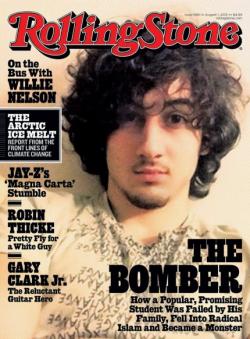Rolling Stone Puts Boston Bomber on Cover, Apparently Making Him America’s Most Admired Young Man
 Quite a brouhaha over Rolling Stone’s decision to put (alleged) Boston bomber Dzhokhar Tsarnaev on its cover. The outrage is coming from all quarters:
Quite a brouhaha over Rolling Stone’s decision to put (alleged) Boston bomber Dzhokhar Tsarnaev on its cover. The outrage is coming from all quarters:
The drugstore chain CVS and Tedeschi Food Shops, both based in New England, are among the businesses that have announced they won’t sell the new issue of Rolling Stone magazine because it features a dreamy cover photo of Dzhokhar Tsarnaev, the 19-year-old suspect in the Boston Marathon bombings that killed three and injured hundreds.
News of the Boston-bomber cover story spread quickly on Tuesday night, prompting immediate outrage — especially in the Boston area. Boston Mayor Thomas Menino sent a letter to Rolling Stone publisher Jann Wenner, stating that the magazine cover “rewards a terrorist with celebrity treatment. It is ill-conceived, at best, and reaffirms a terrible message that destruction gains fame for killers and their ‘causes.’”
The same image of Tsarnaev was widely circulated and used by newspapers and magazines before, but in this context it took on new criticism and accusations that Rolling Stone turned the bombing defendant into something more appealing.
“I can’t think of another instance in which one has glamorized the image of an alleged terrorist. This is the image of a rock star. This is the image of someone who is admired, of someone who has a fan base, of someone we are critiquing as art,” said Kathleen Hall Jamieson, a communications professor and the director of the Annenberg Public Policy Center at the University of Pennsylvania.
CNN:
Ed Kelly, president of the Professional Fire Fighters of Massachusetts, called it “insulting.” Using Tsarnaev’s booking photo might have been one thing, but a photo that shows “the innocence of youth” gives the wrong message, Kelly told CNN.
“He gave up any innocence he had on April 15, when he took the life of an innocent child, two women and then went on to execute a police officer,” Kelly said.
“What he did to a city, a country, we’re never going to forgive him for it,” Kelly said. “We’re not going to cower from it. It disturbs us that our media chooses to celebrate it.”
Our hearts go out to the victims of the Boston Marathon bombing, and our thoughts are always with them and their families. The cover story we are publishing this week falls within the traditions of journalism and Rolling Stone’s long-standing commitment to serious and thoughtful coverage of the most important political and cultural issues of our day. The fact that Dzhokhar Tsarnaev is young, and in the same age group as many of our readers, makes it all the more important for us to examine the complexities of this issue and gain a more complete understanding of how a tragedy like this happens.
As the Washington Post’s Erik Wemple points out, the image is exploitative—but it isn’t just exploitative: It’s also smart, unnerving journalism. By depicting a terrorist as sweet and handsome rather than ugly and terrifying, Rolling Stone has subverted our expectations and hinted at a larger truth. The cover presents a stark contrast with our usual image of terrorists. It asks, “What did we expect to see in Tsarnaev? What did we hope to see?” The answer, most likely, is a monster, a brutish dolt with outward manifestations of evil. What we get instead, however, is the most alarming sight of all: a boy who looks like someone we might know.


